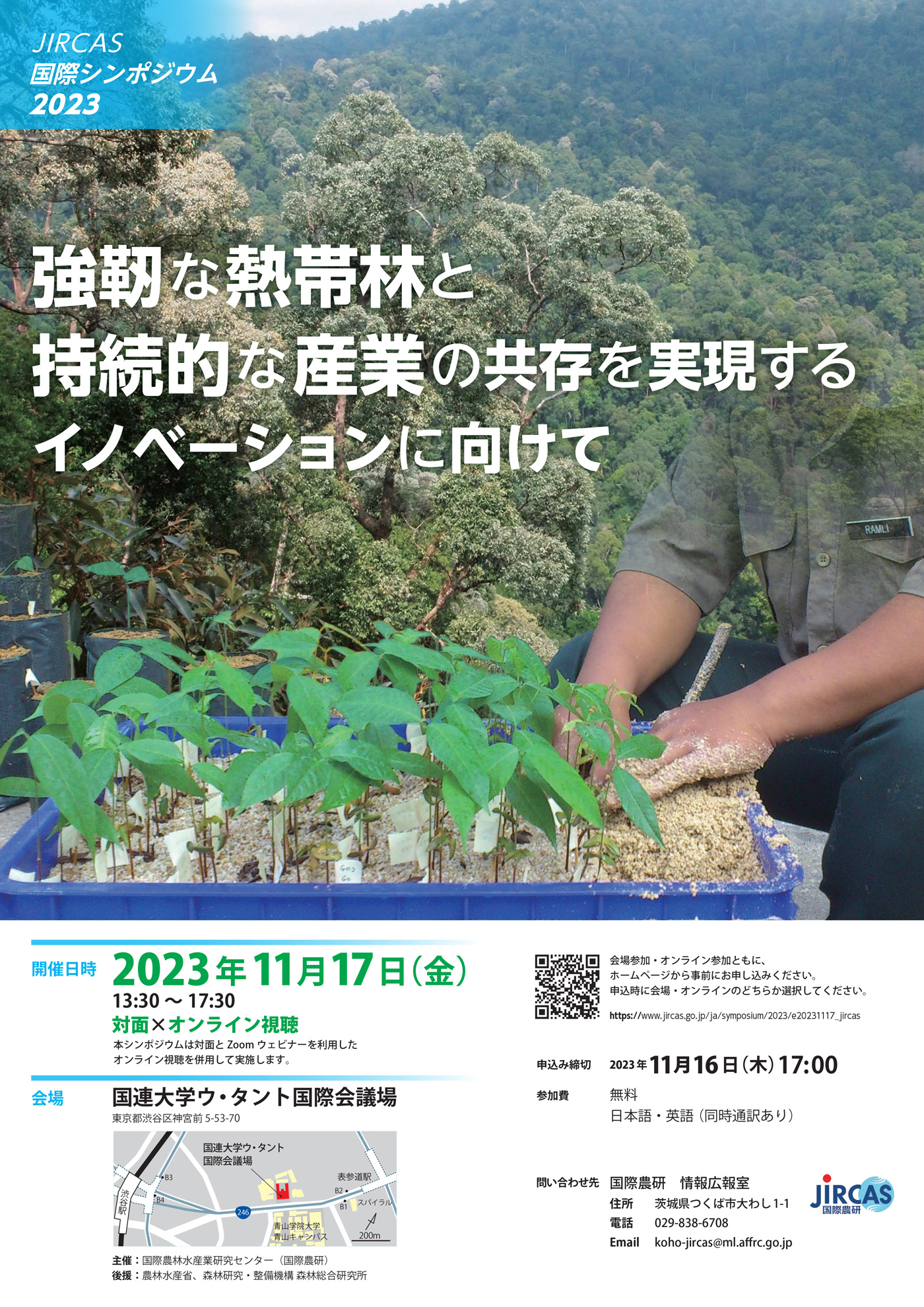JIRCAS International Symposium 2023
“Innovations to enhance the resilience of tropical forests and sustainability of the forest industry”
Tropical forests, located primarily in the low-latitude regions around the equator across Asia, Africa, and Latin America, thrive in areas with consistently high rainfall throughout the year. These lush ecosystems are exceptional in their capacity to absorb substantial amounts of carbon dioxide from the atmosphere through vigorous photosynthesis under abundant sunlight, storing an estimated 40-50% of the carbon dioxide from terrestrial vegetation.
Tropical trees with large amounts of biomass also serve as vital habitats for a wide variety of organisms, ranging from large mammals to insects, and from small animals to bacteria, thus forming the foundation for extremely complex and fragile biodiversity.
The exceptional ability of tropical forests to sequester carbon and support biodiversity plays a pivotal role in regulating the Earth’s climate and environment. As a result, these forests are recognized as an indispensable subsystem in stabilizing the Earth system. At the same time, tropical forests have provided natural resources, such as timber, raw materials for medicines, and have introduced a variety of agricultural crops that are essential for human sustenance.
However, globalization since the mid-20th century has led to uncontrolled exploitation, resulting in accelerated logging and deforestation to make way for cash crop plantations. In 2022 alone, it is estimated that the world has lost 4.10 million hectares of primary tropical rainforest (source: WRI).
Anthropogenic disturbances in tropical forests not only contribute to global warming by releasing carbon stored in trees and soils but also lead to the devastating loss of biodiversity and destruction of the biosphere. Tropical forests are thus becoming net sources of carbon, with feedback mechanisms that could disrupt the entire Earth system. Consequently, from the perspective of stabilizing the Earth system, there is an urgent need to identify and implement sustainable tropical forest management systems that should allow people to enjoy the benefits of tropical forests while also strengthening the critical functions they perform in global climate and environmental regulation.
In recent years, there has been growing international consensus on the need for resource management to enhance the resilience of tropical forests and for industry compliance with rules and regulations to halt deforestation. Achieving both forest conservation and sustainable industrialization requires context-specific, readily applicable innovations, including materials, management protocols, and the establishment of enabling institutions.
The Japan International Research Center for Agricultural Sciences (JIRCAS) plays a leading role in international collaboration and coordination in the areas of agriculture, forestry and fisheries research, contributing to the achievement of the SDGs through the development of technologies to address challenges in these sectors across Asia, Africa and Latin America. As part of these efforts, we have pursued international research collaborations aimed at strengthening the resilience of tropical forests in various Asian countries. Examples include efforts to utilize and manage forest genetic resources adapted to climate change in Indonesia, and promoting sustainable land management for oil palm plantations in Malaysia by adding value to oil palm products to alleviate deforestation pressures.
Given the critical role of tropical forests in the well-being of humanity and the stability of the Earth system, the JIRCAS International Symposium 2023 aims to provide a platform for scientists, the private sector, policy makers, and stakeholders in the value chain to deliberate on opportunities and challenges for enhancing the resilience of tropical forests and the sustainability of forest-based industries. It is noteworthy that 2023 also marks the 50th anniversary of ASEAN-Japan relations, providing a unique opportunity for regional cooperation to highlight the importance of tropical forests in the region.
Poster and Program
- Organized by
-
Japan International Research Center for Agricultural Sciences
- In cooperation with
-
Ministry of Agriculture, Forestry and Fisheries
Forestry and Forest Products Research Institute, Forest Research and Management Organization
- Date
-
2023-11-17(Fri) 13:30~17:30 (JST)
- Place
-
U Thant International Conference Hall + Online (United Nations University 3F, 5-53-70 Jingu-mae, Shibuya-ku, Tokyo 150-0001)
- Program
-
Time
Program
Speakers
13:30-13:50
Opening Remarks
Mr. KOYAMA Osamu
JIRCAS PresidentWelcome Remarks
Mr. KOSAKA Zentaro
Deputy Director-General, Forestry Agency, MAFFDr. NAKASHIZUKA Tohru
Director General, FFPRI13:50-14:30
Keynote Speech 1
Climate Change, Fire and Forest Resilience
Prof. KITAJIMA Kaoru
Vice Dean, Graduate School of Agriculture, Kyoto UniversityKeynote Speech 2
Global Policy Developments and Initiatives on Tropical Forests and Sustainable Industries
Dr. Sonya Dewi
Director of Asia Programme, CIFOR-ICRAF14:30-15:30
Session 1
Enhancing Resilience of Tropical Forest Landscapes and Trees
Chair: Dr. NOGUCHI Shoji
Director, Forestry Division, JIRCASSustainable Forest Management and Conservation Dr. Wan Mohd Shukri Wan Ahmad
Director, Forestry and Environment Division, FRIMEnhancing Tropical Forest Resilience and Production through Tree Breeding Technology Dr. TANI Naoki
Senior Researcher, Forestry Division, JIRCASDeforestation Mechanisms and Sustainable Solutions Dr. MIYAMOTO Motoe
Team Leader, Forest Environmental Policy, Department of Forest Policy and Economics, FFPRI15:30-15:50
Coffee Break
15:50-16:50
Session 2
Improving Industrial Sustainability of Tropical Timber/Non-Timber Products
Chair: Dr. IIYAMA Miyuki
Program Director/Information, JIRCASContributions of Tree Improvement Program to Increase Forest Productivity and Achievement of Indonesian Nationally Determined Contributions (NDCs) Prof. Mohammad Na'iem
Faculty of Forestry, Gadjah Mada UniversityOil Palm Trunk - High Value Technology for Tropical Forest Conservation Dr. KOSUGI Akihiko
Project Leader, Biological Resources and Post-harvest Division, JIRCAS, JapanDevelopment of Timber and Oil Palm Industries in Southeast Asia and International Policy for Tropical Forest Conservation Dr. SAMEJIMA Hiromitsu
Research Manager, Biodiversity & Forests Area, IGES, Japan16:50-17:25
Panel Discussion
Panel Chair: Dr. HAYASHI Keiichi
Program Director/Environment, JIRCAS17:25-17:30
Closing Remarks
Dr. YAMAMOTO Yukiyo
JIRCAS Vice-President - Registration period
-
- (JST)
- Registration
-
Information and Public Relations Office, JIRCASAddress1-1 Ohwashi, Tsukuba Ibaraki 305-8686 JapanTelephone+81-29-838-6708Registration deadline:(JST)
- Registration fee
Free
- Archive
-
【Part1:Opening Remarks - Keynote Speeches】
【Part2:Session 1 “Enhancing Resilience of Tropical Forest Landscapes and Trees” 】
【Part3:Session 2 “Improving Industrial Sustainability of Tropical Timber/Non-Timber Products”】
【Part4:Panel Discussion and Closing】
- Proceedings
- Innovations to enhance the resilience of tropical forests and sustainability of the forest industry
- Poster
-

Information and Public Relations Office, JIRCAS
-
Address1-1 Ohwashi, Tsukuba Ibaraki 305-8686 Japan
-
Telephone+81-29-838-6708
-
Emailkoho-jircas@ml.affrc.go.jp
-
URLhttps://www.jircas.go.jp/en/form/inquiry
